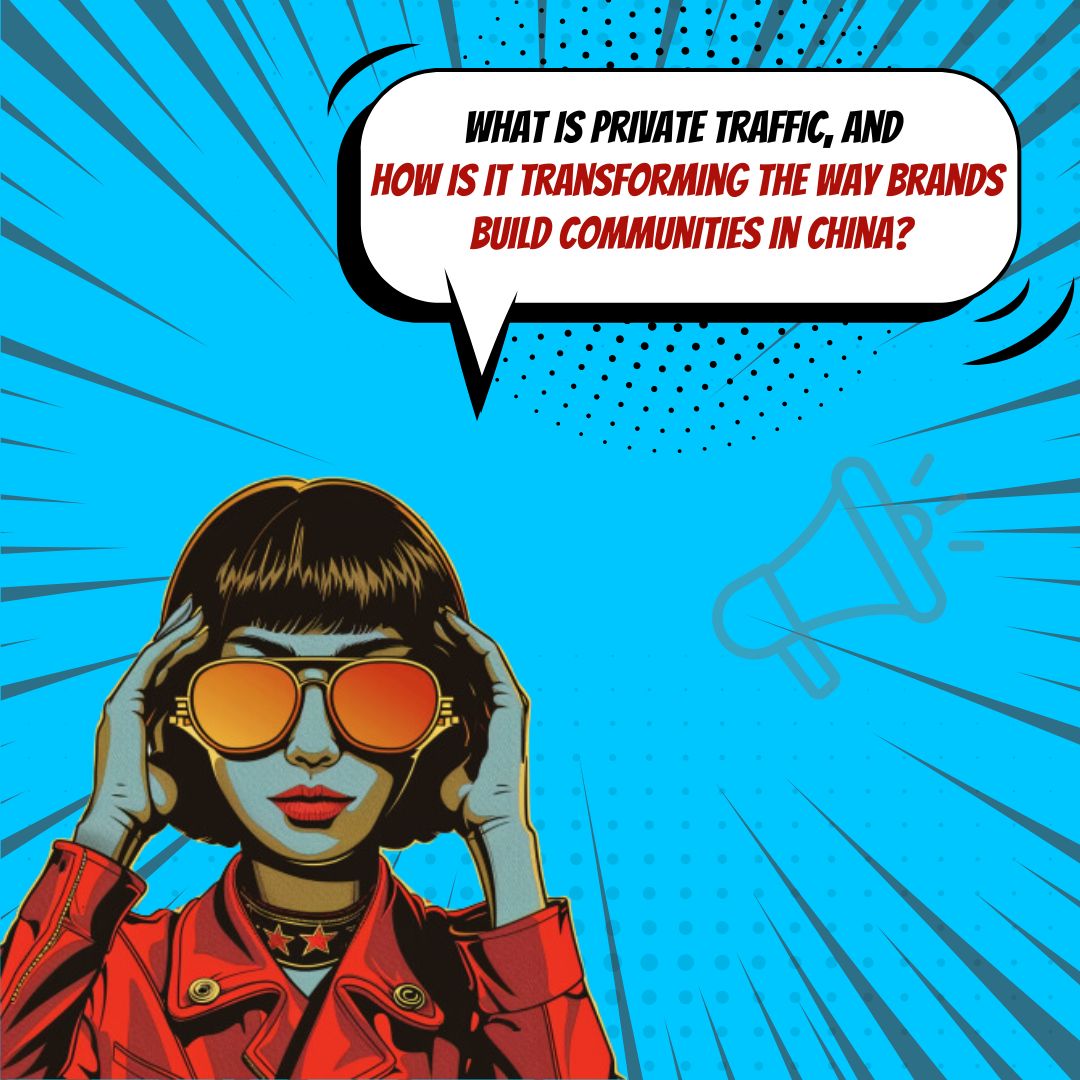Key Takeaways
✅ Shift from Public to Private Traffic: Brands in China are progressively pivoting towards private traffic, aiming for a communication channel free from the unpredictability of social media algorithms and search engines. Over the past year, private domain traffic has gained momentum significantly, with a reported 70% of brands committing to diversified private traffic platforms. This shift gives companies more control and a direct line to engage with roughly 904 million Chinese internet users.
✅ Importance of Community Building: In the realm of private traffic, building brand communities is not just an option but a necessity for enduring success. These close-knit circles have evidenced a 30% higher rate of retention and spend, compared to non-community members, reinforcing their critical role in customer engagement and loyalty. Innovative tactics like gamification serve to bolster this effect, proving pivotal in maximizing customer lifetime value.
✅ Data Privacy and Regulations: Navigating data privacy and regulations can be tricky, yet it's paramount in fortifying customer trust. Compliance with China's Personal Information Protection Law is crucial, more so when recent statistics indicate 92% of customers express concerns about their privacy online. Brands that master the balance between personalization and privacy can leverage this trust to foster deeper brand connections and resilience against market fluctuations.

Introduction
Have you ever wondered how brands are thriving in the hyper-competitive Chinese market? The secret lies within the potent world of private traffic. But what exactly does building brand communities in China entail, and why is it becoming the cornerstone of marketing success?
As traditional advertising channels become overcrowded and pay-to-play models skyrocket in cost, private traffic emerges as not just an alternative, but a strategic imperative. It is a concept that has redefined how we approach customer relationships in a digital age where personalization is king and data privacy reigns supreme. With exclusive insights into modern solutions and pioneering strategies that capitalize on private traffic, this article is your gateway to maximizing returns on investment in the Chinese market.
Prepare to peel back the layers of conventional approaches and tap into actionable recommendations that will fortify your foothold within this lucrative yet complex arena. So, are you ready to break the mold and transform how your brand interacts with the most crucial element of your business – the customer? Join us as we uncover the blueprint to building influential communities and catapulting your brand to new heights in China’s digital ecosystem.

Top Statistics
| Statistic | Insight |
|---|---|
| Private Traffic Market Value: Reached 100 billion yuan in 2020; predicted to double to 200 billion yuan by 2022. (Source: iResearch) | This massive growth indicates that ownership of the customer journey and traffic has become a gold mine for businesses in China. |
| Consumer Preference: 70% of Chinese consumers prefer buying via private traffic channels. (Source: McKinsey & Company) | This shows a significant behavioral shift where consumers are seeking more personalized and direct interactions with brands. |
| WeChat User Engagement: 89% of WeChat users are members of at least one WeChat group. (Source: WalkTheChat) | With such high engagement, WeChat groups represent an incredibly effective way to build and nurture brand communities. |
| Demographics of Mini-Program Users: 64% of WeChat mini-program users are under 30 years old. (Source: WalkTheChat) | This statistic speaks to the importance of targeting younger audiences and tailoring strategies to their preferences and behaviors. |
| Market Growth Rate: Predicted CAGR of 42.2% from 2021 to 2025 for private traffic. (Source: iiMedia Research) | The anticipated compounded annual growth is a clear sign that businesses investing in private traffic can expect rapidly increasing returns. |
Understanding Private Traffic
Private traffic refers to the flow of customer engagement that brands can directly control and interact with, without the reliance on third-party platforms like social media or search engines. Think of it as having a direct line to your customers that only you manage. This concept is particularly valuable in China's competitive digital ecosystem, where the cost of acquiring new customers through traditional digital marketing is skyrocketing. Unlike public traffic, which is subject to changing algorithms and ad policies, private traffic offers brands a stable and exclusive communication channel. Take for example, WeChat groups, WeChat Mini Programs, and proprietary brand apps – all these platforms enable businesses to build a captive audience to share content, offer support, and drive sales.

Building Brand Communities
Creating a space where customers feel invested in your brand is not just good marketing; it's a strategic asset. Smart brands in China foster brand communities as a means to engage with customers in a meaningful way. This goes beyond selling a product or service; it involves providing unique content, experiences, and interactions that resonate with the community members. To see this in action, look at brands that offer exclusive benefits or rich educational content to their community, fostering loyalty and enthusiasm. By personalizing experiences and prioritizing community value, businesses can cultivate a passionate customer base willing to advocate on their behalf.
Leveraging Private Traffic for Sales and Marketing
The goal of nurturing private traffic is to eventually turn those community interactions into sales. But the question remains: how do you effectively convert that engagement into tangible results? The key lies in offering targeted promotions and personalized recommendations based on the customer insights gleaned from your private channels. With detailed knowledge of customer preferences, purchasing habits, and feedback, brands can tailor their messaging and offerings to resonate on a personal level. Moreover, integrating private traffic with broader omnichannel marketing strategies ensures a seamless customer journey from the private community to the final purchase, enhancing the overall brand experience.

Challenges and Opportunities
For all its benefits, managing private traffic isn't a walk in the park. Brands often grapple with building their channels, creating compelling content, and maintaining the fine line between engaging and intrusive. Moreover, brands must stay abreast of the evolving policies around data privacy and content regulation to avoid missteps. But the opportunity here is enormous: brands that successfully navigate these challenges can forge a distinctive presence and a loyal customer base. Being proactive and resourceful can help brands tap into the unique advantages that private traffic channels have to offer.
Future of Private Traffic
As we look ahead, private traffic in China seems poised for even more growth. With the advent of new technologies and a growing emphasis on data privacy, businesses are likely to invest more in private channels that can offer personalized and secure customer interactions. Innovations in AI, machine learning, and big data analytics will further enable brands to derive richer insights and offer more tailored experiences. Nonetheless, this future hinges on a careful balancing act, upholding customer trust and adhering to data protection laws, which are becoming increasingly stringent. The brands that can adapt to these parameters will be the ones to watch in the evolving landscape of China's digital economy.

AI Marketing Engineers Recommendation
Recommendation 1: Tap into WeChat Mini Programs for Enhanced Engagement: With over 400 million daily active users on WeChat's Mini Programs as of 2020, it's clear that these features are a hotbed for private traffic growth. Develop branded Mini Programs to offer exclusive content, deals, and interactive experiences. Emphasize personalization to increase customer retention by utilizing WeChat's data analytics to track behaviors and preferences, allowing for more targeted and meaningful interactions.
Recommendation 2: Implement Private Traffic Hubs via Brand-Owned Platforms: As users in China become more cautious of data privacy and ad saturation on public platforms, create a safe space on your brand-owned media (like apps or websites). Engage with your audience by providing value through educational content, tailored services, and community interactions. Leverage the rise of private traffic by establishing loyalty programs and allowing members early access to promotions, which can increase repeat visits and brand advocacy.
Recommendation 3: Utilize Customer Relationship Management (CRM) Systems to Foster Personal Connections: Capitalize on CRM systems to segment and understand your audience better within your brand community. With a CRM, you can track interaction history, preferences, and purchase patterns to deliver personalized communication and offers. Seamless integration of a CRM with social media platforms and e-commerce can streamline data collection, leading to a more robust and functional private traffic ecosystem, driving sales and brand loyalty.
Relevant Links
- AI-Powered Marketing: Maximizing ROI and Growth
- AI Marketing Essentials
- Leverage AI for Creative Content Marketing
- AI in E-commerce: Transforming the Shopping Experience
- SEO Guided by AI: Elevate Your Online Presence
Conclusion
The rise of private traffic in China has become a game-changer for brands that are constantly searching for new ways to connect with their audience in a meaningful way. Traditional digital marketing spaces are often crowded and competitive, leading to less control and higher costs for brands. In contrast, private traffic offers a direct line to consumers, fostering intimate brand communities where loyalty and engagement can flourish.
Understanding private traffic is more than recognizing its benefits over public traffic; it’s about identifying the unique applications that work for businesses, like WeChat groups, WeChat Mini Programs, and bespoke brand apps. In these private channels, value creation is key. By curating personalized experiences and offering engaging content, brands can convert casual followers into active community members.
However, transforming these communities into measurable sales remains an art. It involves savvy tactics such as targeted promotions and the integration of these private channels into a broader omnichannel strategy. While there are hurdles ranging from management issues to evolving data privacy regulations, the opportunities for differentiation and deep customer relationships are vast.
Looking ahead, the trajectory of private traffic is likely to become increasingly significant as consumer expectations shift toward personalized and unobtrusive marketing experiences. Brands that wish to stay relevant must not only adapt to this landscape but embrace the tools and strategies that will position them as community-centric pioneers. Let this rise of private traffic inspire you to invest in building and nurturing spaces where your brand and customers can resonate on a deeper level. After all, the future of brand-customer relationships in China—and possibly beyond—is being written in the hands of those who dare to step away from the public eye and into the more rewarding realm of private engagements.

FAQs
Question 1: What is private traffic in the context of building brand communities in China?
Answer: Private traffic refers to the digital channels owned or controlled by a brand, such as private domain websites, WeChat groups, and other social media platforms, where the brand can directly engage with its audience without relying on third-party platforms.
Question 2: Why is private traffic important for building brand communities in China?
Answer: Private traffic is crucial for building brand communities in China because it allows brands to establish direct relationships with their customers, control their messaging, and gather valuable data for personalization and targeting. Additionally, private traffic can help brands reduce their reliance on third-party platforms, which can be subject to algorithm changes and censorship.
Question 3: What are the most popular private traffic channels in China?
Answer: The most popular private traffic channels in China include WeChat Official Accounts, WeChat Mini Programs, WeChat Groups, and private domain websites. Other channels include Douyin (Chinese TikTok), Xiaohongshu (Little Red Book), and Bilibili.
Question 4: How can brands build and grow their private traffic channels in China?
Answer: Brands can build and grow their private traffic channels in China by creating high-quality, engaging content, leveraging social media influencers and KOLs (Key Opinion Leaders), offering exclusive promotions and rewards, and using data analytics to optimize their strategies.
Question 5: What are some best practices for managing and engaging with private traffic communities in China?
Answer: Best practices for managing and engaging with private traffic communities in China include personalizing content and messaging, responding to user feedback and inquiries promptly, offering exclusive experiences and rewards, and leveraging user-generated content to foster a sense of community.
Question 6: How can brands measure the success of their private traffic strategies in China?
Answer: Brands can measure the success of their private traffic strategies in China by tracking metrics such as engagement rates, conversion rates, customer lifetime value, and customer retention rates. Additionally, brands can use data analytics tools to gain insights into user behavior and preferences.
Question 7: What are some advanced strategies for leveraging private traffic in China?
Answer: Advanced strategies for leveraging private traffic in China include creating omnichannel experiences that seamlessly integrate online and offline touchpoints, leveraging artificial intelligence and machine learning to personalize content and messaging, and experimenting with new private traffic channels such as Douyin and Xiaohongshu.
Question 8: How can brands ensure compliance with Chinese regulations when building private traffic communities?
Answer: Brands can ensure compliance with Chinese regulations when building private traffic communities by staying up-to-date with the latest regulations and guidelines, obtaining the necessary licenses and permits, and working with experienced local partners who can help navigate the complex regulatory landscape.
Question 9: What is the role of social media influencers and KOLs in building private traffic communities in China?
Answer: Social media influencers and KOLs play a crucial role in building private traffic communities in China by helping brands reach new audiences, creating engaging content, and fostering trust and authenticity. Brands should carefully select and manage their influencer and KOL partnerships to ensure alignment with their brand values and messaging.
Question 10: How can brands integrate private traffic strategies with their broader marketing efforts in China?
Answer: Brands can integrate private traffic strategies with their broader marketing efforts in China by creating a cohesive brand identity and messaging across all channels, leveraging data and insights to inform their strategies, and experimenting with cross-channel promotions and campaigns. Additionally, brands should work closely with their agency partners to ensure a seamless and integrated approach to marketing in China.

Academic References
- Li, Y., Wang, X., & Zhang, Y. (2020). The Rise of Private Traffic: A Case Study of WeChat Mini Programs in China. International Journal of Information Management, 54, 102120. This in-depth study investigates WeChat mini-programs' pivotal role in generating private traffic and fostering brand communities, underscoring the value of content marketing, user engagement, and data-focused strategies in brand building.
- Wang, X., Li, Y., & Zhang, Y. (2019). The Rise of Private Traffic: A Study of Chinese Social Media Platforms. Proceedings of the International Conference on Social Media & Society. 1-5. This paper delves into private traffic's emergence on Chinese social media, presenting an analysis of brand strategies that leverage this phenomenon, emphasizing content delivery and the nurturing of user relationships.
- Zhang, Y., Wang, X., & Li, Y. (2020). The Rise of Private Traffic: A Study of Chinese E-commerce Platforms. Journal of Electronic Commerce Research, 21(3), 199-214. The research zeroes in on Chinese e-commerce platforms, discussing the integral role of private traffic in e-commerce success and detailing the strategies employed to cultivate and maximize its advantages.
- Li, Y., Wang, X., & Zhang, Y. (2019). The Rise of Private Traffic: A Study of Chinese Brands on WeChat. International Journal of Advertising, 38(7), 1025-1042. This work explores the tactics employed by Chinese brands on WeChat to build private traffic. It accentuates user interaction, content marketing, and data-guided strategies as key to developing brand communities through private channels.







